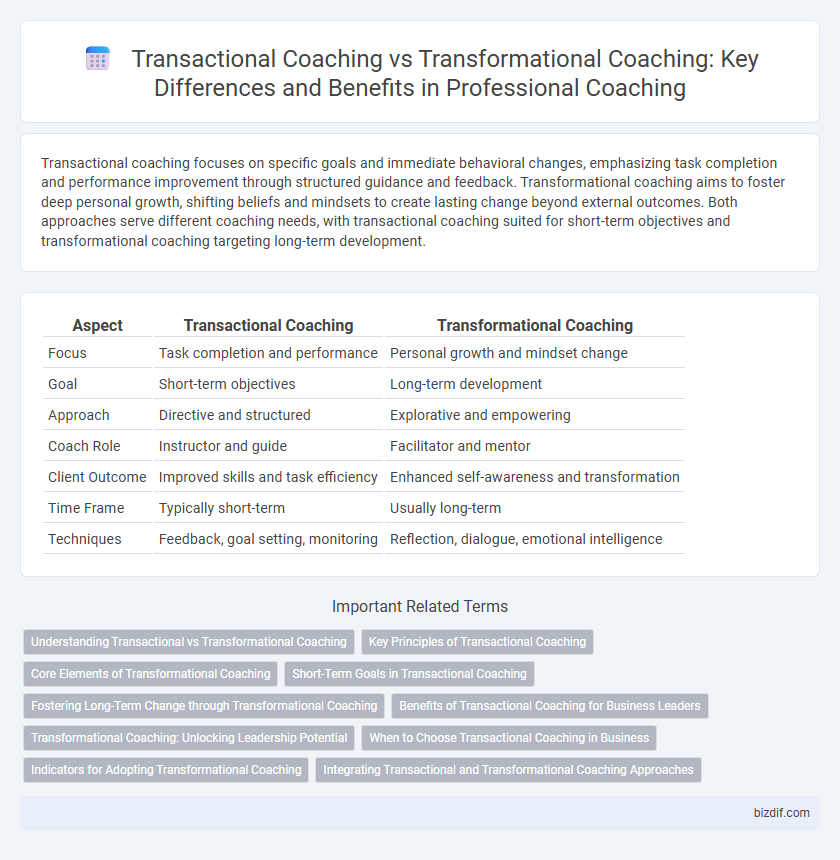Transactional coaching focuses on specific goals and immediate behavioral changes, emphasizing task completion and performance improvement through structured guidance and feedback. Transformational coaching aims to foster deep personal growth, shifting beliefs and mindsets to create lasting change beyond external outcomes. Both approaches serve different coaching needs, with transactional coaching suited for short-term objectives and transformational coaching targeting long-term development.
Table of Comparison
| Aspect | Transactional Coaching | Transformational Coaching |
|---|---|---|
| Focus | Task completion and performance | Personal growth and mindset change |
| Goal | Short-term objectives | Long-term development |
| Approach | Directive and structured | Explorative and empowering |
| Coach Role | Instructor and guide | Facilitator and mentor |
| Client Outcome | Improved skills and task efficiency | Enhanced self-awareness and transformation |
| Time Frame | Typically short-term | Usually long-term |
| Techniques | Feedback, goal setting, monitoring | Reflection, dialogue, emotional intelligence |
Understanding Transactional vs Transformational Coaching
Transactional coaching centers on specific goals and measurable outcomes, emphasizing short-term performance and task completion through structured feedback and accountability. Transformational coaching goes deeper, fostering profound personal growth, mindset shifts, and intrinsic motivation to unlock lasting behavioral change and enhanced self-awareness. Understanding the distinction highlights the choice between fixing immediate issues and enabling long-term development in coaching relationships.
Key Principles of Transactional Coaching
Transactional coaching centers on specific goals and measurable outcomes, emphasizing performance improvement through clear contracts and structured feedback. It relies heavily on setting expectations, monitoring progress, and reinforcing behavior with rewards or consequences. The key principles include clarity in objectives, accountability, and a focus on short-term achievements aligned with organizational or personal targets.
Core Elements of Transformational Coaching
Transformational coaching centers on core elements such as deep self-awareness, values alignment, and mindset shifts that drive meaningful personal growth. Unlike transactional coaching, which targets specific goals and task completion, transformational coaching fosters long-term behavioral change through emotional intelligence, reflection, and expanded consciousness. Key components include building trust, exploring limiting beliefs, and developing resilience to create sustainable life and professional improvements.
Short-Term Goals in Transactional Coaching
Transactional coaching emphasizes short-term goals by targeting specific skills, behaviors, or performance outcomes that can be quickly measured and adjusted. It focuses on immediate improvements within a set timeframe, often using structured feedback and task-oriented strategies. This approach suits situations requiring rapid results, such as skill acquisition or performance enhancement in the workplace.
Fostering Long-Term Change through Transformational Coaching
Transformational coaching fosters long-term change by addressing core beliefs and values, enabling individuals to achieve profound personal growth and sustained behavior shifts. Unlike transactional coaching, which focuses on short-term goals and task completion, transformational coaching facilitates deep self-awareness and emotional intelligence development. This approach enhances resilience and adaptability, empowering clients to navigate complex life and work challenges over time.
Benefits of Transactional Coaching for Business Leaders
Transactional coaching enhances business leaders' performance by focusing on specific goals, measurable outcomes, and skill development, which drives immediate improvements in productivity. This coaching style promotes accountability and clarity by establishing clear expectations and feedback loops, essential for managing teams and achieving short-term business objectives. Leaders benefit from structured guidance that aligns daily tasks with organizational targets, fostering efficiency and operational success.
Transformational Coaching: Unlocking Leadership Potential
Transformational coaching focuses on unlocking leadership potential by fostering deep self-awareness, emotional intelligence, and long-term behavioral change in leaders. This coaching approach enables leaders to align their values with organizational goals, enhancing decision-making, motivation, and influence. Unlike transactional coaching, which targets specific tasks and short-term performance, transformational coaching drives sustainable growth and authentic leadership development.
When to Choose Transactional Coaching in Business
Transactional coaching is ideal for businesses seeking to improve specific skills, performance metrics, or achieve short-term goals with clear, measurable outcomes. It focuses on task completion, process adherence, and reinforcing accountability, making it effective for managing operational efficiency and immediate challenges. Companies aiming for quick performance improvements or skill development in defined areas benefit most from this targeted coaching approach.
Indicators for Adopting Transformational Coaching
Indicators for adopting transformational coaching include a client's desire for deep, sustainable change that goes beyond immediate problem-solving, reflecting a commitment to personal growth and development. Signs such as openness to self-reflection, motivation to enhance emotional intelligence, and readiness to challenge limiting beliefs suggest transformational coaching will be more effective than transactional approaches. Organizations or individuals aiming to foster long-term leadership qualities and adaptive resilience also benefit significantly from transformational coaching frameworks.
Integrating Transactional and Transformational Coaching Approaches
Integrating transactional and transformational coaching approaches enhances client development by combining goal-oriented strategies with deep personal growth processes. Transactional coaching focuses on specific tasks and performance metrics, while transformational coaching aims to shift mindsets and values for long-lasting change. Blending these methods optimizes coaching outcomes by addressing immediate objectives alongside underlying behavioral and psychological barriers.
Transactional coaching vs transformational coaching Infographic

 bizdif.com
bizdif.com